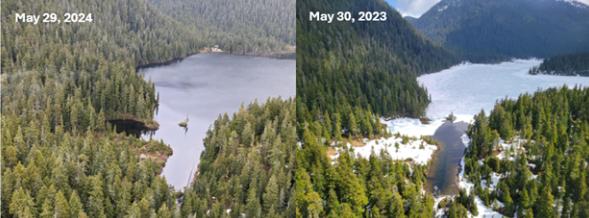The snowpack is gone.
On June 5, the Sunshine Coast Regional District (SCRD) announced that the snowpacks for the Chapman Lake and Edward Lake watersheds have melted.
Little over a month after Stage 1 water restrictions came into effect, the SCRD said to expect Stage 2 restrictions in the coming weeks.
This is among the earliest that the SCRD has seen the snowpack dissipate, said the news release.
“The melting of the snowpack in early spring plays a huge role in the recharge of our water systems. Therefore, SCRD staff are doing all they can to prepare for the adverse effects of predicted warm and dry weather on our community,” said Remko Rosenboom, SCRD General Manager of Infrastructure Services in the SCRD release.
Despite rains in May and June, residents are being advised to prepare for a dry summer.
Lawns lament
The message was clear: it is time to start being careful with water. Residents often begin watering their lawns as soon as it starts to get warmer out, the release noted. Saying that Stage 2 restrictions may not be needed in mid-June if residents on SCRD water systems keep conservation on their minds, it asked residents to resist the urge to water their lawns.
Snowpack
SCRD officials have been watching the snowpack as it hit record lows mid-winter, recovering somewhat as spring neared. At the beginning of May, the snowpack was at 69 per cent of normal, where at the beginning of March it had been at 37 per cent of normal.
Chapman Water System is “rain dependent,” Rosenboom has stressed in water updates to SCRD directors. While the level of the snowpack influences water supply in the early spring, which plays a role in when system users are moved to Stage 2 and Stage 3 conservation measures, it is the rain and temperature conditions in June and subsequent months that play the largest roles in the need to invoke Stage 4 (severe) water use rules, he explained.
As of June 1, the provincial goverment said that 52 per cent of seasonal snow across B.C. has melted, roughly six per cent higher than average and noted that a heat event from May 9 to 12 caused increased melting.
Province prepares
The province is forecasting a hot summer and advising residents to take precautions.
It is expanding the free portable air conditioner program to reach 19,000 more eligible households and providing improvements to long-term care and assisted living homes to protect seniors from climate impacts, officials said earlier this week.
“Now is the time to take steps to prepare yourself and your family so you can be safe and ready for potential impacts of extreme heat and wildfire smoke,” said Dr. Bonnie Henry, provincial health officer, in the release.
Jordan Copp is the Coast Reporter’s civic and Indigenous affairs reporter. This reporting beat is made possible by the Local Journalism Initiative.
– With files from Connie Jordison



